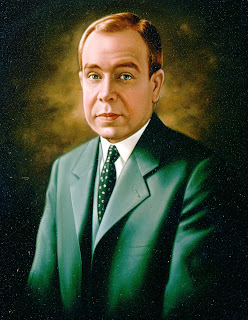The Value of Theological Exemplars
 Yesterday I posted on my recent visit to the special collections archive at Princeton Seminary. At the end of that post I noted that I was not more holy or especially anointed because I had handled Benjamin Breckinridge Warfield’s personal scrapbooks. My remarks, of course, were not intended to slight the Lion of Princeton, but to give glory to whom it really belongs, the Lord Jesus Christ.
Yesterday I posted on my recent visit to the special collections archive at Princeton Seminary. At the end of that post I noted that I was not more holy or especially anointed because I had handled Benjamin Breckinridge Warfield’s personal scrapbooks. My remarks, of course, were not intended to slight the Lion of Princeton, but to give glory to whom it really belongs, the Lord Jesus Christ.However, there is a proper place for the critical appreciation and appropriation of the insights and theological formulations of bygone theologians and eras. In other words, we as Protestants, Reformed and Presbyterian Protestants in particular, do have an appreciation for tradition. This, rightly considered, does not put us in jeopardy of stepping onto the path that leads to Rome or Constantinople. One does not have to worship or venerate saints from the past to appreciate them. And treating the theological treasures of past ages with contempt is no sure sign of spirituality.
Quite frankly, it is chronological snobbery that leads us to think that we have nothing to learn from the past. So says C. S. Lewis. And I agree with him. At least on this point. We sometimes act as if the Holy Spirit was only active in our generation or only in our minds. On the contrary, the Holy Spirit has been with the church from the beginning and there is much to learn from the saints who have gone before us. C. S. Lewis, with whom I do not always agree, tells us that the benefit of reading writers from the past is that we gain insight into the blind spots of our own age. Each era has its own unique besetting sins or blind spots, and one age differs from another. So the reading of theologians from past eras helps us not only to recognize the blind spots in the era of, say, Jonathan Edwards, but it equally help us to see the blind spots in our own age. That is no mean feat!
Earlier I noted that we ought to critically appreciate and appropriate theological exemplars from the past. The word “critical” is important here. I sometimes run across people who think that a saint or theologian (they can be one and the same!) must be accepted or rejected en toto. Not so. Just as I can critically interact and learn from contemporary saints and scholars, I can and ought to do the same with theologians and writers from the past. Even though I am a student of Cornelius Van Til, I can read Thomas Aquinas with benefit. Even though I live in the 21st century, there is much to gain from reading and digesting the Reformed Scholastics (Franciscus Junius, anyone?). I can even learn from Gordon H. Clark (shudder the thought!). Believe it or not I even read R. Scott Clark, Darryl G. Hart, and Jonathan Edwards and live to tell about it!
I am not arguing for mere eclecticism here. I do have a worldview through which I filter these various past and contemporary theologians and by which I assess their contributions to the theological enterprise and life of the church. I would describe mine as a Reformed and Presbyterian worldview molded by Scripture and the Westminster Standards.
In the end, if a saint from the past, or a contemporary theologian helps me to better understand Scripture or the faith, I do well to pay attention. Paul told the Corinthians that the experiences of the children of Israel were set down as examples for them (1st Cor. 10:1-13). By analogy I think we can say the same thing about tradition. Paul also told his readers to follow him as he followed Christ (1st Cor. 11:1). The point is not to be a slavish imitator of the past or even of the present. The point is to exercise spiritual discernment, and critical accumen in the reading of the great saints and theologians (or the great saints who were theologians).
Let’s not be afraid of tradition. It is a biblical concept when rightly understood. As it was once put, tradition is the living faith of the dead and traditionalism is the dead faith of the living.
*The portrait of J. Gresham Machen is from a series of portraits of Reformed theological greats located at Westminster Seminary California.


